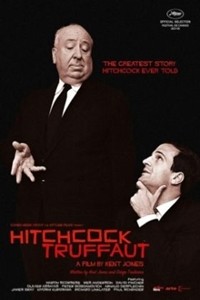 Hitchcock/Truffaut
Directed by: Kent Jones
Hitchcock/Truffaut
Directed by: Kent Jones
Starring: Martin Scorsese, Wes Anderson, David Fincher, Richard Linklater, and more
By Michael Clawson of Terminal Volume
I first encountered the famous Hitchcock/Truffaut book during a film history course in college. I’ll never forget that it was the cheapest book I bought that semester — I think my used copy was $8, a minuscule fraction to that of my other textbooks, which were usually in the low three figures. All these years later and I still have it, the only textbook that didn’t get sold back at a dramatic loss. The book is a 300-plus-page set of interviews done in 1962 between French director François Truffaut and British director Alfred Hitchcock. It’s not even really interviews, but more discussion as the two directors talk about the cinema and their respective careers. Truffaut, through an interpreter, goes film by film, idea by idea, into Hitchcock’s impressive oeuvre. The resulting conversations, done over a week, are essentially the Rosetta Stone for film because it lays out the language of the cinema — how to edit, how to compose, how to move the camera.
The book, and its continued importance in an age where the average shot is something like a nanosecond buried within Michael Bay spectacle, has been turned into a documentary film with the same name. One of the greatest books on film deserves an equally great documentaries, which is a tall order that Hitchcock/Truffaut doesn’t quite deliver on. The film, although slickly produced and edited, never aims for the same goals as the book. It mostly serves as an appendix to it, with moving pictures and audio of the interviews supplementing the book’s printed text. This is helpful if you enjoy supercuts of clips, but it doesn’t accurately frame the importance of the interviews.
I’m mostly annoyed with the talking-heads approach to this film, and to modern documentaries in general. Martin Scorsese is here, as is David Fincher, Richard Linklater, Paul Schrader and many others. They slather on praise and analysis, but they offer little context. They’re incredibly insightful and knowledgeable of Hitchcock’s style, but they essentially regurgitate how important the book, and by extension Hitchcock’s films, are to the art of the cinema. This has already been established, so show us, don’t tell us. I wanted the movie to teach, and to really get into the nuts and bolts of Hitch’s style. And it doesn’t.
After lengthy clip montages and exuberant sequences of modern filmmakers praising the director, the film does eventually get to deeper aspects of Hitchcock’s cinematic poetry. This largely starts during a section on Vertigo, where camera movement and the film’s diabolical themes are really deconstructed. In one of the more fascinating bits, we watch as Judy returns to her apartment after being remade by Jimmy Stewart’s Scottie character. Scottie is remaking Judy in the image of a dead woman, and Judy has returned with her hair not quite right. “She has stripped but she won’t take her knickers off,” Hitch tells Truffaut in the interviews.
Hitchcock/Truffaut recovers from this point on, diving into Psycho and then into Hitchcock’s role as an innovator of story, plot, effects and pretty much every aspect of filmmaking. If you have no desire to read the book, the film will be entertaining, but it won’t be the education that the book has been for close to 50 years. Do yourself a favor and get the book. It was the best $8 I spent at the bookstore.









